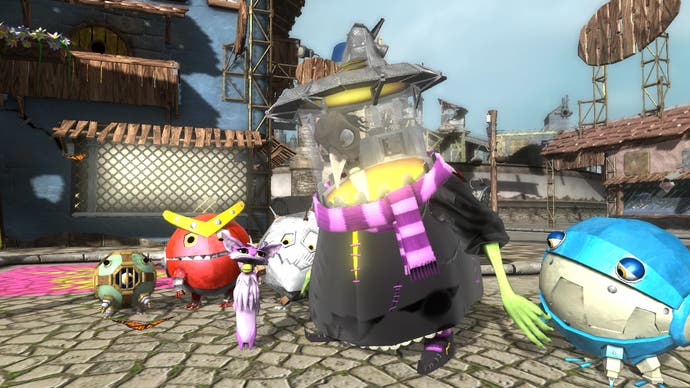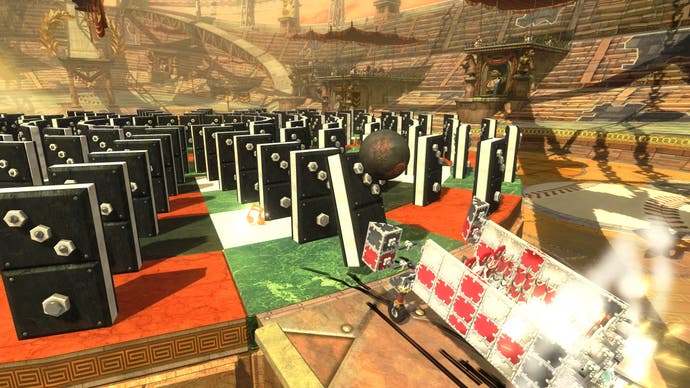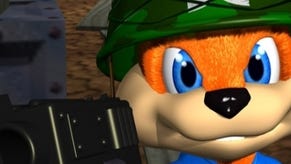Banjo-Kazooie: Nuts & Bolts
Throttled.
If Banjo-Kazooie has a star though (with the possible exception of Chester Cheatah rip-off Trophy Thomas), it's the Duplo simplicity of Mumbo's workshop, which you visit to build vehicles. It can seem overwhelming at first, and you can't always find a great camera angle with the right stick, but the system of rotating and positioning car, boat, plane and helicopter parts in three dimensions is easy to grasp - certainly compared to LittleBigPlanet's Create mode, or Guitar Hero World Tour's Recording Studio, to use a couple of recent examples of content suites. Your mistakes - like fitting propellers to thin air, or forgetting to put on a seat - are highlighted and easily remembered in future, and there's an instant-access test-track to iron out the kinks. Not that you encounter serious ones, because you really can stick things together and go. As long as there's an engine, fuel and a seat, and wheels, wings or floaters, you can take to land, air and sea without much thought. First stabs may wobble and flounder, but basics like weight distribution are quickly absorbed and implemented.
Part of that is because the plug-and-drive vehicles respond logically. Adding physics to something as make-believe as Banjo-Kazooie was always going to be a bit peculiar (witness Insomniac's piecemeal struggle in Ratchet on PS3), but Rare's utterly fake science is a thematically coherent arrangement of mass, inertia and gameplay concessions, like flying underwater. With a fast, simple-to-grasp set of engineering rules and unreal-world consequences, there's a lot more headroom for personal touches and sparks of inspiration: a barn door-fronted scooter for demolishing an igloo, a mile-wide biplane for downing dominoes, or a flying bucket for collecting coconuts. When the task design peaks, like the elaborate Jiggoseum events, Nuts & Bolts is essential.

But it can't sustain it. In fact, it's really quite a while before it even hits the first of its few peaks. Lessons haven't been learned after Viva Piñata's lengthy and muddled introduction, and Nuts & Bolts drags you through several (admittedly good) interactive jokes before bludgeoning you with instructions, tutorials and other details for half an hour, many of which could have been handled in-line with a bit of Valvish craft, or simply entrusted to observation and intuition. By the time the game recovers, it's only to settle into a rhythm of bland repetition.
The races can be fun, but are too often won by finding a few more engine parts in town so you can increase the horsepower (bearpower?), and restarting a few times to adjust for awkward spills. Just as, if not more common are fetch-and-carry missions, which involve ferrying objects or critters from one spot to another as efficiently as possible, and it wouldn't be unfair to observe that all you're doing, for large spells, is designing bigger and better wagons and trolleys. As much as you want to dive into the editor and create solutions, the problems aren't taxing enough, and only in a few special cases do you have to think beyond speed, size or capacity. As it becomes apparent just how badly the task design misfires, the deepening tedium is exacerbated by other peculiar choices, like forcing you to crank unlocked jiggies out of a vending machine, stack them on your starter cart, and drive them back to Showdown Town centre to put them in the bank. Your reward for winning is to tidy up after yourself.

It's a testament to how corrosive the weak mission design is that a good multiplayer component is scant reprieve, even though it concentrates the game's best elements, with race and sport tasks that might as well be a Greatest Hits of the single-player. Playable on Xbox Live with a party system, it arguably makes for a more compelling offline competition to try and best a time or complete an objective. Given a few minutes with the editor to make the perfect long-jumping car, or golf-club aeroplane, close proximity ensures the rivalry and collaborative ingenuity that LittleBigPlanet nurtured and we had hoped the core of Nuts & Bolts would capitalise upon. It's here where it's clearest that the game's unspoken aim - to transplant the build-to-solve gizmo-construction mentality of your Bridge Builders, Armadillo Runs and Elefunks, onto a Banjo skeleton - was worth sidetracking the last scion of Xbox platforming to attempt.
But whereas a traditional platform game could survive a sequence of poor levels, or even succeed in spite of a majority with a world as lovely as this, with characters so delightful and secrets so pleasing to uncover, Banjo-Kazooie: Nuts & Bolts is not a platform game. The game it has become instead demands thoughtful, exciting challenges that inspire the player to pitch in and help get the most out of each level, but it fails to provide them, and even though it's worth persevering with for the occasional hurdles race, egg-and-spoon and a game-world in aptly Rare form, ultimately it's a brilliant shell with a mostly hollow centre.





